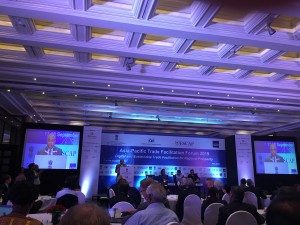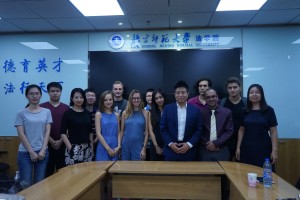Prof. Xue @ Asia Pacific Trade Facilitation Forum 2019
![IMG_1601[1]](http://wiki.iipl.org.cn/wp-content/uploads/2019/09/IMG_16011-125x250.jpg) The Asia-Pacific Trade Facilitation Forum (APTFF) is the leading regional platform for the exchange of information, experiences and practice on trade facilitation. The APTFF has been organized by the Asian Development Bank (ADB), the United Nations Economic and Social Commission for Asia and the Pacific (ESCAP) and a growing number of partners since 2009, including UNCTAD, WCO and WTO. It is held biennially and attracts more than 250 participants from 30 countries. The 9th APTFF took place at the Hyatt Regency Hotel Delhi, New Delhi, India on 17-18 September 2019. The Forum was organized by ESCAP and ADB in collaboration with the Government of India and the Confederation of Indian Industries.
The Asia-Pacific Trade Facilitation Forum (APTFF) is the leading regional platform for the exchange of information, experiences and practice on trade facilitation. The APTFF has been organized by the Asian Development Bank (ADB), the United Nations Economic and Social Commission for Asia and the Pacific (ESCAP) and a growing number of partners since 2009, including UNCTAD, WCO and WTO. It is held biennially and attracts more than 250 participants from 30 countries. The 9th APTFF took place at the Hyatt Regency Hotel Delhi, New Delhi, India on 17-18 September 2019. The Forum was organized by ESCAP and ADB in collaboration with the Government of India and the Confederation of Indian Industries.
The Forum focused on how digital and sustainable trade facilitation measures and practices can bring prosperity to the Asia-Pacific region and investigated the opportunities from trade digitalization for sustainable development of the region, and challenges ahead in materializing such opportunities. it featured panel discussions, interactive and informative sessions allowing participants to share experiences and perspectives on different aspects of trade facilitation, including trade finance, cross-border e-commerce, paperless trade, and innovative application of emerging technologies, among others. The Forum brought relevant regional initiatives and implementation cases to each session to make it a unique opportunity to share knowledge and practical lessons. A number of side events were organized throughout the week in collaboration with other partners to provide more in-depth exploration of pertinent trade facilitation issues. The Forum also included an exhibition for relevant service providers and international organizations to promote their work in this area.
Prof. Xue gave an important presentation at Session 5: Trade facilitation for e-commerce: Emerging innovations for seamless cross-border transactions by emphasizing the value of cross-border data flow in the paperless trade facilitation and encouraged the Member States to take action according to the WTO TFA with respect to data regulations. Prof. Xue’s presentation attracted many questions from the audience and she responded effectively to each of them.
Prof. Xue was also invited to take part in the APTFF Capacity Building Workshop on Cross-border Paperless Trade Facilitation, a side event organized by UNESCAP and ADB. The workshop brought relevant regional stakeholders of cross-border paperless trade and shared experiences and lessons learnt in its facilitation, including issues and challenges faced and actions and measures for implementation. The government officials from selected developing countries in the region as well as representatives from the initiatives on cross-border electronic data exchange from the region and beyond participated in the workshop. Prof. Xue gave the expert legal opinions on seven countries’ studies on challenges and way-forward for cross-border paperless trade. Her comments impressed all the stakeholders from the relevant development countries as well as the professionals from the international organizations.
Permalink Comments off


![IMG_1497[1]](http://wiki.iipl.org.cn/wp-content/uploads/2019/09/IMG_14971-300x225.jpg)
![IMG_1509[1]](http://wiki.iipl.org.cn/wp-content/uploads/2019/09/IMG_15091-e1567498126567-300x225.jpg)
![IMG_0989[1]](http://wiki.iipl.org.cn/wp-content/uploads/2018/09/IMG_09891-300x225.jpg)
![IMG_1033[1]](http://wiki.iipl.org.cn/wp-content/uploads/2018/09/IMG_10331-300x225.jpg)
![IMG_1036[1]](http://wiki.iipl.org.cn/wp-content/uploads/2018/09/IMG_10361-300x225.jpg)

![IMG_0049[1]](http://wiki.iipl.org.cn/wp-content/uploads/2017/10/IMG_00491-300x225.jpg)

